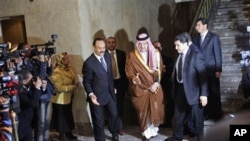Arab League foreign ministers meeting in Cairo Saturday ended a closed door session by calling on the U.N. Security Council to impose a no-fly zone over Libya.
The decision by Arab diplomats to ask the U.N. Security Council to impose a no-fly zone over Libya came after a lengthy closed door debate.
Omani Foreign Minister Youssef Ben Alawi told a press conference after the meeting that "all Arab states supported the call for a no-fly zone." Al Jazeera TV however had reported earlier that Algeria, Yemen, Syria and Sudan opposed the decision.
Ben Alawi noted that the decision to call for the no-fly zone was the result of pressure from public opinion to alleviate the suffering of the Libyan people. He said that the pressure of public opinion both in the Arab world and from across the globe has prompted the Arab League to act. He adds that TV images of events in Libya are tugging on the consciences of everyone and pushing for action.
Ben Allawi emphasized that the Arab League remains "opposed to any foreign intervention" in the Libyan crisis, and that a no-fly zone "must end with the end of that crisis."
Arab League Secretary General Amr Moussa told journalists that the Arab League decision was designed to "protect the Libyan people." He went on to says that the Arab League also decided to "open channels of communication" with the Libyan rebel national council based in Benghazi.
Moussa mentioned that U.N. Secretary General Ban Ki moon has appointed a special representative to Libya to act as a go-between with the regime of embattled leader Moammar Gadhafi:
He says that the Secretary General has appointed former Jordanian Foreign Minister Abdel Ilah al-Khatib as his special representative to Libya to discuss the humanitarian situation there.
NATO has called for "firm regional support" as a necessary condition for the imposition of a no-fly zone over Libya.
European Union leaders agreed at a meeting on Friday to consider all options to pressure Mr. Gadhafi to step down. The leaders did not however endorse a no-fly zone, air strikes or the use of other forms of military force.
U.S. President Barack Obama has indicated that the U.S. is considering various options, including military intervention, but stressed the need for U.N. authorization.
Arab League Wants Libyan 'No-Fly' Zone




